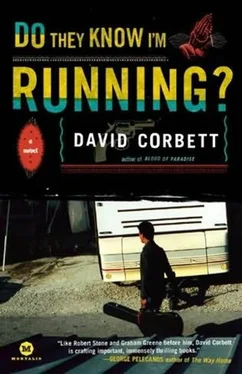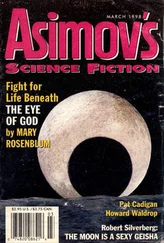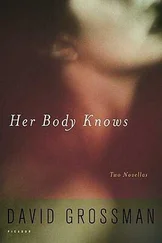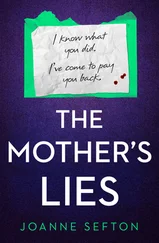The boy walked him out to the car. Lyndell had nothing more to say and hoped the boy didn’t, either. You don’t need to repay me damn it, he wanted to say, but why be rude?
Finally the boy cleared his throat and started in again on how he’d never forget their kindness, Lyndell only half listening. It felt like his whole insides were tangled up in nettles. A sixteen-wheeler rumbled past and screamed to a hissing stop at the traffic signal but the boy just raised his voice and kept on talking and despite a kind of weary grace what Lyndell saw in his eyes was fear. To love is to be afraid, he thought, then suddenly the boy was pumping his hand and he turned back and disappeared inside the room, at which point Lyndell found himself just standing there, his mind as blank as a wall of chalk.
He slipped behind the station wagon’s wheel, then couldn’t bring himself to start the motor. He thought about what she’d said, so humble so shy so rough, luckiest day of her life. I have loved you with all my heart but never so much as today. He knew what was waiting for him back at the house, he’d been secretly picturing it the entire time while trying to think of anything but. He wished with all his heart there was some other way home.
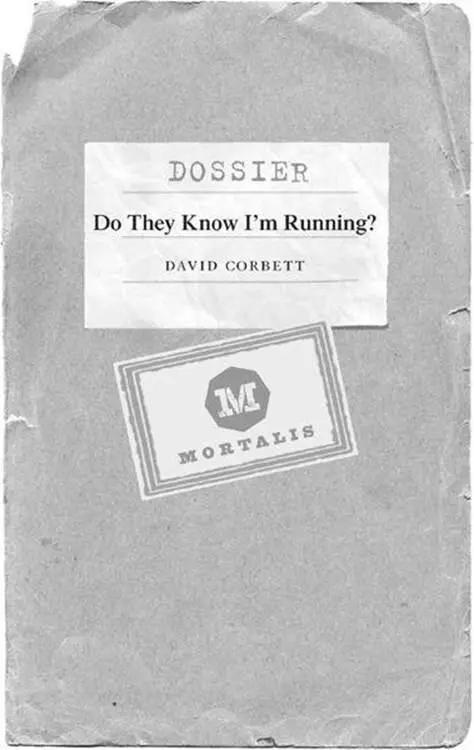
GOING HUMBLY
An Ear for Tone
I grew up in central Ohio, a fairly provincial and racially segregated backwater at the time, despite the presence of the state-house and one of the country’s largest universities, Ohio State. Before I left, this was changing; African Americans were gaining ground politically, economically and socially, the university’s international draw in both students and faculty was quite literally changing the face of the local community, and Columbus was growing into the major metropolis it has become. But I saw firsthand, at times within my own home, the sometimes subtle and other times quite blatant transformation of small-town rectitude and middle-American conformity into racist fear and anger and contempt.
The word “nigger” was a constant drumbeat among the working-class white guys I hung out with, so much so that by the time I made my first black friend-his name was Adrian Bennett, we were both fourteen, working together as volunteers at the Center for Science and Industry-I was startled by how “normal,” how like myself, he was.
I felt embarrassed by this reaction and still do. Although I was not paralyzed by white guilt, I realized I was by no means innocent. I bore the emotional and conceptual baggage of my place and time and no amount of feel-good hipness could cure me completely.
In a way racism is not unlike alcoholism. The tendency cannot be escaped, merely controlled, and the control requires insight, honesty and discipline. Put differently, it requires one to become more fully human. And like an alcoholic, I very much wish I did not have the thoughts and feelings and impulses I still sometimes observe within myself. I wish I was color-blind, race-blind. Instead, I have tried to become insightful and conscientious, I’ve learned to question and control my impulses, I’ve learned to listen and observe.
Much has changed. I now live in a very mixed community in a California neighborhood so diverse I once reflected, during our yearly Nationwide Night Out get-together, that I and my neighbors looked like we’d been transplanted from a Jonathan Demme movie-white, blacks, Latinos, Filipinos, all intermingling effortlessly with genuine warmth and fondness. We look out for one another and involve ourselves in one another’s lives.
It’s the twenty-first century. All is well, no?
When I first came to California in the mid-seventies, I worked briefly at a Los Angeles restaurant with a largely Mexican staff. I was supervised by a waiter named Ramon, who asked me to help him learn French, in return for his help in teaching me Spanish. But Ramon was not merely generous and curious. He was also proud, world-wise and reserved. He knew that I, as an Anglo, might easily replace him as head waiter if the Caucasian owners saw fit or if customers groused. The other Mexican waiters also treated me with a mix of helpfulness and detachment; one actually picked a fight with me in the dressing room. And though none of the other waiters who were there came to my defense, none of them jumped in to help my adversary either. The fight was between me and him; we could fend for ourselves.
What is strange to me upon reflection of these incidents is how different in character my feelings were at the time than the racism I’d known growing up. There were clearly tensions between us-and those tensions were the result of our being of different color and class and culture-but there was also an awareness of one another as human. I’d known no Latinos in central Ohio; the Great Brown Threat had yet to register on our radar. I had not been indoctrinated in community-wide resentment and fear. Latin Americans were not the Other, to be feared and mistrusted, controlled and repelled. Not yet, anyway.
But I remain very much attuned to tone. I have a pretty good radar for bigotry, due to my own struggles with it. It’s for that reason that I’ve grown increasingly disturbed at the poisonous distortions that too often overwhelm the immigration debate. I detect in the shrillness that old familiar fear and guilt and anger, with its gloss of righteous indignation and “common sense” and its rhetoric of protection-defense of our borders, our laws, our culture, our way of life.
One of the most frequent things one hears is the epithet “illegal immigrant,” with the underlying insinuation that the undocumented are intrinsically criminals, since their very existence in this country is testimony to their violating our immigration statutes. And criminals deserve no compassion, no respect, no “amnesty.”
I see the situation somewhat differently. When my wife was dying of cancer, she was once in such extreme pain that, as I drove her to the emergency room, I ran two stop signs and a red light, driving over eighty miles per hour in twenty-five-miles-per-hour zones. She later thanked me, even though what I did was clearly against the law. I would do it again.
The “crime” attributed to undocumented immigrants in crossing the border is analogous-and much less dangerous to everyone but themselves. They do what they must for the sake of the well-being of their loved ones. If this is the moral outrage immigration opponents make it out to be, show me the innocent. Are we to champion as virtuous the heartless, the indifferent, the scared, the ones willing to just sit there and watch their families suffer under the oppressive weight of corruption, poverty and crime that increasingly characterize Mexico and Central America-conditions for which the United States, though not entirely at fault, is nonetheless far from blameless?
The Latino Patriots
Something else was happening while the anti-immigrant backlash was building: Latinos were joining the military in unprecedented numbers. Not just that-their casualties in the Iraq war were disproportionately higher than their representation in the armed services as a whole (11% compared to 9%).
Interestingly, the reasons Latino recruits gave for enlisting was not just the expedited path to full citizenship put into effect by Congress at the request of the Bush administration, though that did frequently remain a motivating factor. A Rand National Defense Research Institute study revealed that in post-enlistment surveys Latino recruits listed “patriotism” and “service to country” as the top two reasons for joining the service, followed by “duty” and “honor.” Many soldiers noted that their families were proud of them, even if they disagreed with the Iraq war.
Читать дальше
